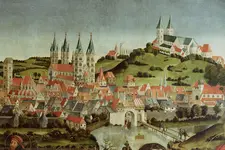Programme Profile

Thanks to the range of disciplines involved, the bachelor’s degree programme in History gives you the opportunity to delve into the subject from antiquity to the present in various ways: the academic units in Ancient History, Medieval History, and Modern History cover the whole breadth of history from antiquity until the modern age. The units in the History and Culture of Late Antiquity, the History of Economics and Innovation and Economic and Social History with Special Emphasis on Labour and Education explore history through the respective lenses of their subject areas. The units in the Auxiliary Sciences of History and Digital History teach the necessary methods for indexing historical material, while Didactics of History deals with topics related to teaching history and a culture of remembrance. The field of regional history orients itself spatially and is taught with an integrated approach by the academic units focusing on particular time periods and the Institute for Franconian Regional History.
Individual fields of knowledge are connected through comparative and interdisciplinary work across historical periods and draw on neighbouring disciplines. Cooperations with institutions abroad and in the region enrich this broad spectrum of subjects.
You can select your courses individually from this wide range. The programme structure allows for subjects that give you both a broad overview of the discipline and allow you to specialise.
I started studying for a secondary school teaching qualification. But at the same time, I also completed a bachelor’s degree. So, I never had the feeling that I was stuck on a single path.
Hendrik Göschel
History student
Programme objectives
The bachelor’s degree programme in History...
- provides the opportunity to gain comprehensive insights into history in the ancient, medieval, early modern and modern periods, including the unique topics and research perspectives of each subdiscipline involved. And in doing so, the programme uses specific examples to address key events and issues in history from ancient to modern times in an in-depth manner
- teaches students discipline-specific theories, approaches and tools within the field of history – including digital working methods – so they can independently contextualise and interpret historical sources and analyse, evaluate and critically engage with specialist historical literature
- enables students to gain foreign language skills and other key competencies alongside insights into related subject areas in order to form their own academic profiles
- establishes links to actual historical work in historically relevant locations and in the corresponding professional fields through modules focused on practical application
- leads to a first academic and professionally oriented degree, qualifying the student to begin a master’s degree programme in the subject History.




